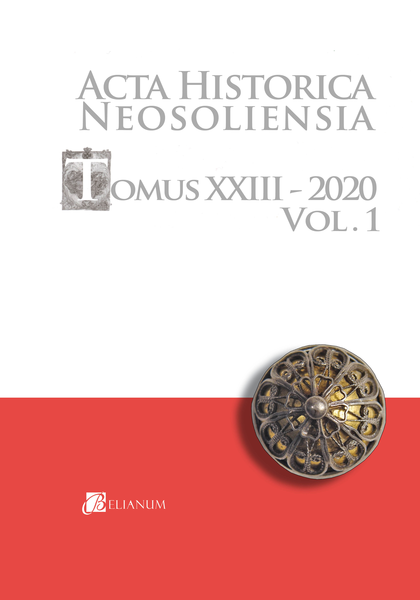KÓNYA, P. – KÓNYOVÁ, A.: Caraffa 330. Štúdie k dejinám Prešovského krvavého súdu = Tanulmányok az Eperjesi vértörvényszék történetéhez. Prešov : Vydavateľstvo Prešovskej univerzity, 2018. (V. Žeňuch)
Archív
Úplné textové verzie vo formáte PDF
- Acta historica Neosoliensia - Tomus 26, num. 1
- Acta historica Neosoliensia - Tomus 25, num. 2
- Acta historica Neosoliensia - Tomus 25, num. 1
- Acta historica Neosoliensia - Tomus 24, num. 2
- Acta historica Neosoliensia - Tomus 24, num. 1
- Acta historica Neosoliensia - Tomus 23, num. 2
- Acta historica Neosoliensia - Tomus 23, num. 1
- Acta historica Neosoliensia - Tomus 22, num. 2
- Acta historica Neosoliensia - Tomus 22, num. 1
- Acta historica Neosoliensia - Tomus 21, num. 2
- Acta historica Neosoliensia - Tomus 21, num. 1
- Acta historica Neosoliensia - Tomus 20, num. 2
- Acta historica Neosoliensia - Tomus 20, num. 1
- Acta historica Neosoliensia - Tomus 19, num. 2
- Acta historica Neosoliensia - Tomus 19, num. 1
- Acta historica Neosoliensia - Tomus 18
- Acta historica Neosoliensia - Tomus 17
- Acta historica Neosoliensia - Tomus 16
- Acta historica Neosoliensia - Tomus 15
- Acta historica Neosoliensia - Tomus 14
- Acta historica Neosoliensia - Tomus 13
- Acta historica Neosoliensia - Tomus 12
- Acta historica Neosoliensia - Tomus 11
- Acta historica Neosoliensia - Tomus 10
- Acta historica Neosoliensia - Tomus 09
- Acta historica Neosoliensia - Tomus 08
- Acta historica Neosoliensia - Tomus 07
- Acta historica Neosoliensia - Tomus 06
- Acta historica Neosoliensia - Tomus 05
- Acta historica Neosoliensia - Tomus 04
- Acta historica Neosoliensia - Tomus 03
- Acta historica Neosoliensia - Tomus 02
- Acta historica Neosoliensia - Tomus 01

